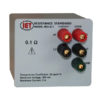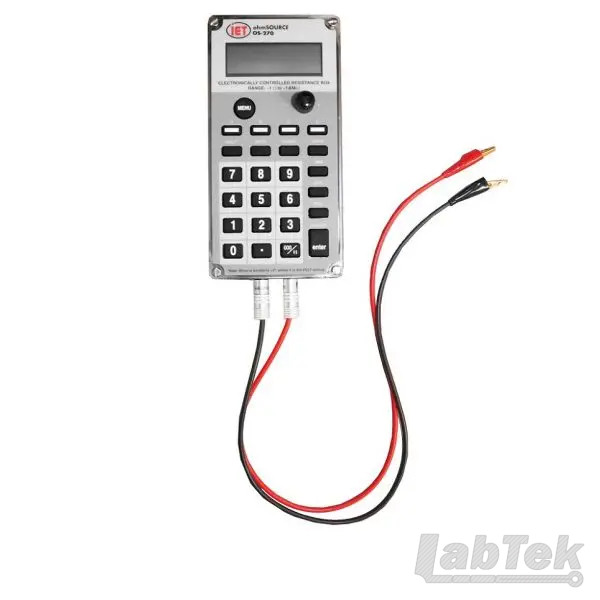Microprocessor-controlled and loaded with innovative features, the ohmSOURCE Programmable Resistor succeeds in providing highly accurate and precise resistance values in an intuitive and user-friendly fashion.
Resistance range of up to 24 MΩ and a power rating of up to 1 Watt, the handheld ohmSOURCE decade boxes are practical for all industries including automotive, medical, test and measurement and telecommunications.
Translation tables makes the ohmsource an ideal RTD calibrator, there is no need for operators to use conversion tables, just select temperature and the correct resistance is automatically selected.
See the PRS-330 Precision Programmable Resistor for applications requiring improved accuracy and remote control via USB, IEEE or ethernet interfaces.
FEATURES AND BENEFITS
Keypad Interface Enter resistance values using a calculator-style keypad.
Quick Value Keys: store/recall up to four frequently used resistance values with one touch.
Memory Keys: Store resistance values in up to 10 additional memory locations (0-9).
Current Limiter Limits the amount of current passing through the decade box to prevent possible damage.
Open Key: Electrically isolate the ohmSOURCE connections from the application with the touch of a key.
Increment Value Setting Change resistance by user-defined increments or select standard resistance values (1%, 5%, 10%)
Automatic Eliminates Residual Resistance – the residual resistance is automatically factored out in output resistance value.
Sensor simulation dual display operation being one of the key features, once programmed for your sensor of choice the unit of measure along with the resistance is viewed simultaneously on the display: Platinum Resistive Temperature Devices (RTD, PRTD), Negative temperature coefficient (NTC) Thermistors, Conductivity, Strain gauges, Potentiometric sensors (position, level)
The USB interface on the OS-270 and OS-260 uses an FTDI chip set. Normally when the Ohmsource is connected to a computer using the USB port, Windows 7 and higher will search for the correct driver and as long as the computer is connected to the internet the driver should automatically be installed. If the driver is not automatically installed the drivers can be installed from FTDI Virtual COM Port Drivers website


